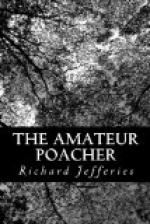The slow rumble of waggon-wheels seldom disturbed the dreamy silence, or interrupted the song of the birds; so seldom that large docks and thistles grew calmly beside the ruts untouched by hoofs. From the thick hedges on either side trailing brambles and briars stretched far out, and here and there was a fallen branch, broken off by the winds, whose leaves had turned brown and withered while all else was green. Round sarsen stones had been laid down in the marshy places to form a firm road, but the turf had long since covered most of them. Where the smooth brown surfaces did project mosses had lined the base, and rushes leaned over and hid the rest.
In the ditches, under the shade of the brambles, the hart’s-tongue fern extended its long blade of dark glossy green. By the decaying stoles the hardy fern flourished, under the trees on the mounds the lady fern could be found, and farther up nearer the wood the tall brake almost supplanted the bushes. Oak and ash boughs reached across: in the ash the wood-pigeons lingered. Every now and then the bright colours of the green woodpeckers flashed to and fro their nest in a tree hard by. They would not have chosen it had not the place been nearly as quiet as the wood itself.
Blackthorn bushes jealously encroached on the narrow stile that entered the lane from a meadow—a mere rail thrust across a gap. The gates, set in deep recesses—short lanes themselves cut through the mounds—were rotten and decayed, so as to scarcely hold together, and not to be moved without care. Hawthorn branches on each side pushed forward and lessened the opening; on the ground, where the gateposts had rotted nearly off, fungi came up in thick bunches.
The little meadows to which they led were rich in oaks, growing on the ‘shore’ of the ditches, tree after tree. The grass in them was not plentiful, but the flowers were many; in the spring the orchis sent up its beautiful purple, and in the heat of summer the bird’s-foot lotus flourished in the sunny places. Farther up, nearer the wood, the lane became hollow—worn down between high banks, at first clothed with fern, and then, as the hill got steeper, with fir trees.
Where firs are tall and thick together the sunbeams that fall aslant between them seem to be made more visible than under other trees, by the motes or wood dust in the air. Still farther the banks became even steeper, till nothing but scanty ash stoles could grow upon them, the fir plantations skirting along the summit. Then suddenly, at a turn, the ground sank into a deep hollow, where in spring the eye rested with relief and pleasure on the tops of young firs, acre after acre, just freshly tinted with the most delicate green. From thence the track went into the wood.
By day all through the summer months there was always something to be seen in the lane—a squirrel, a stoat; always a song-bird to listen to, a flower or fern to gather. By night the goatsucker visited it, and the bat, and the white owl gliding down the slope. In winter when the clouds hung low the darkness in the hollow between the high banks, where the light was shut out by the fir trees, was like that of a cavern. It was then that night after night a strange procession wended down it.




